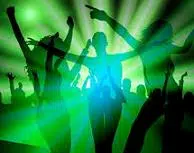The etymological origin of the term disco is in Greek. And it is the result of the sum of two very different parts of said language:
-The noun “diskos”, which can be translated as “disk”.
-The name “theke”, which is synonymous with “deposit” or “box”.
The first meanings of the term disco mentioned by the dictionary of the Royal Spanish Academy ( RAE ) refer to a collection of record albums and the furniture or place where said collection is kept. The most common use of the concept, however, refers to the public establishment where people go to listen to music, dance and drink.
 For example: “Juana will celebrate her birthday at a downtown nightclub,” “I met my girlfriend at a nightclub,” “I woke up late today because I was late at a nightclub with my friends last night.”
For example: “Juana will celebrate her birthday at a downtown nightclub,” “I met my girlfriend at a nightclub,” “I woke up late today because I was late at a nightclub with my friends last night.”
Also called discos , nightclubs , nightclubs or nightclubs , discotheques usually operate at night . It is common that people, to access them, must pay an entrance fee . Once inside, they have the possibility of buying drinks (including alcoholic beverages ) and dancing in the spaces set up for this purpose.
The music heard in a nightclub generally comes from the records played by a disc jockey or DJ . Sometimes there are bands that perform live. It is also common for there to be professional dancers hired by the club to liven up the night.
So that minors can also have fun in a discotheque, so-called matinées or light discos often operate. In these cases, adults are not allowed entry. In addition, alcoholic beverages are not sold at the venue, which closes its doors at midnight (while conventional clubs operate all night long ).
Nightclubs, in short, are places of recreation and socialization that are most popular on Friday and Saturday nights, when a large number of people usually choose them to have fun.
Throughout history there have been many nightclubs. However, one of those that managed to become an international reference was known as Studio 54, which was located in New York City.
West 54th Street in Manhattan is, specifically, where that nightclub was located that was very famous worldwide in the 1970s, coinciding, above all, with the time when disco music was sweeping everywhere and where In society there was a boom in sexual freedom.
That it had the appearance of a theater, that it served as the headquarters of the San Carlo opera company or that it had been a film and television studio are some of the curiosities of this nightclub that became very famous due to the large number of celebrities who came to it. Among those were from Diana Ross and Andy Warhol to Brooke Shields, Mick Jagger, John Travolta, Yves Saint Laurent, Al Pacino, Richard Gere, Farrah Fawcett...
Likewise, from Studio 54 it was known not only that sexual encounters were held in the box area, but also that drug consumption was very common.
